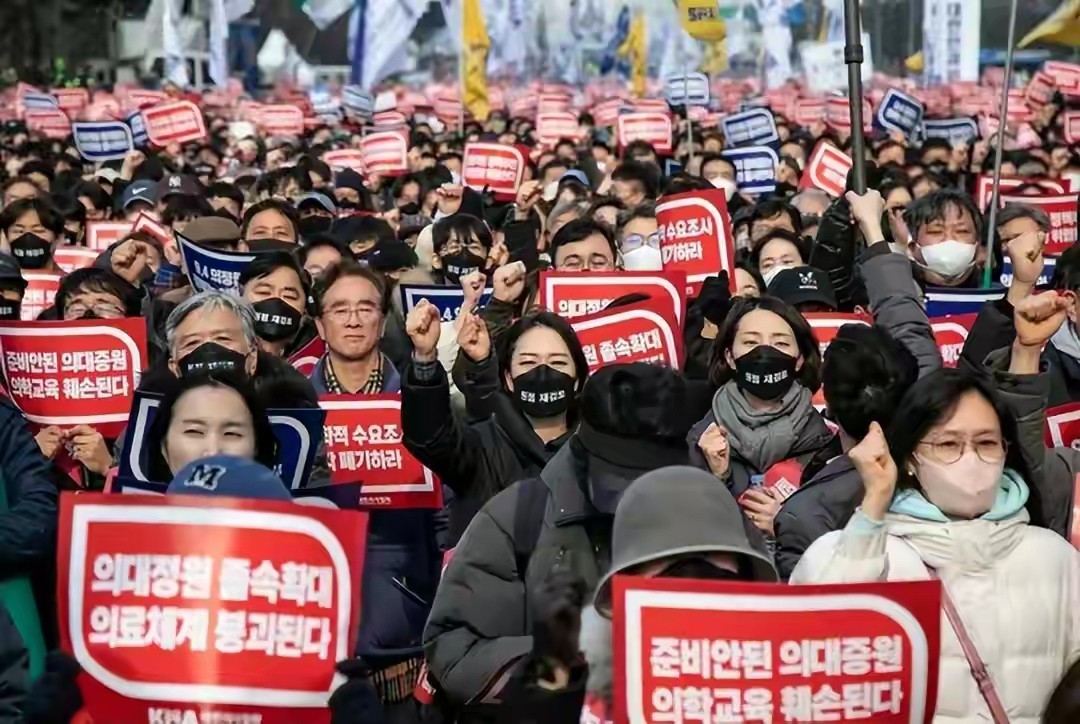
From March 3rd to 5th local time, the Korean Medical Association held a national mobilization conference for doctors in Seoul. As of now, the doctor resignation strike in South Korea has been ongoing for a full two weeks, and the front line of healthcare in South Korea is on the brink of collapse.
Recently, the strike and resignation of doctors in South Korea have become one of the focal points of global attention. This incident not only exposed deep-seated problems in the healthcare system in South Korea, but also sparked widespread public questioning of the professional ethics of doctors. From the current situation, it appears that the deadline for resigning doctors to be ordered to return to work has passed, and the South Korean government has taken coercive measures starting from March 4th.
The South Korean government has issued an ultimatum to these doctors: if they do not return to work, their medical licenses will be revoked. Now it seems that Yin Xiyue is not just talking about it this time, but is going to take it seriously. The South Korean government has also set February 29th as the final deadline for doctors to return to work, but before this day, nearly 10000 doctors in South Korea still submitted resignation reports.
As is well known, there has always been a shortage of medical personnel in South Korea, and the government plans to expand the enrollment of new students from medical colleges to solve this contradiction from the source. But these doctors are afraid that the expansion of enrollment in universities will affect their employment and income. They even disregard the safety of patients, leave their jobs without permission, and threaten to maintain their vested interests by leaving. It is truly selfish and extremely selfish.
Since February 20th, there has been a wave of resignations among South Korean doctors, and at the same time, many medical students on campus have also begun to go on strike. In the statistics one week later, over 10000 doctors from 100 hospitals in South Korea have submitted resignation applications. At the same time, the number of doctors leaving work has exceeded 9000, which is undoubtedly astonishing for South Korea.
Some media insiders sharply pointed out that the government's expansion of enrollment for medical students is to ensure the cultivation of medical talents, which is understandable. However, these working doctors are threatening the government with the excuse of using their own cake, which is a bottomless approach. Some netizens have expressed that a group of doctors in a country can confront the government for their own selfish interests, disregarding the safety and health of patients. Such a person who has lost their conscience is also worthy of being a doctor?
Meanwhile, during the doctor's strike, heartbreaking tragedies continue to occur. Recently, an elderly person with a heart attack was on his way to the hospital but was delayed in receiving treatment due to seven hospitals refusing to accept him, resulting in his unfortunate death.
It is reported that the South Korean government entered the hospital on the 4th to confirm the list of doctors who have not returned to work, and stated that as long as they return to work before this, they will receive lenient treatment. But as of the morning of March 4th, only 565 people have resumed work.
In response, the South Korean government has adopted a strategy of combining administrative and judicial measures, punishing doctors who fail to resume work on time, including suspending their medical licenses for three months. South Korean President Yoon Seok yeol's attitude towards this matter is even more resolute. A public opinion survey shows that over 80% of the population supports the government's plan to increase the number of doctors. At the same time, the government stated that it will resolutely not compromise on the behavior and unreasonable demands of doctors, and will take all necessary measures to ensure the normal operation of medical services.
In addition, the South Korean recruitment department has issued a notice stating that fresh graduates from universities do not need to complete all military service obligations to enter hospitals for work, but once doctors resign, they need to fulfill their military service obligations. South Korea has started the process of revoking the licenses of over 7000 doctors and interns who have left their posts, and has announced that they will be sent to serve in the military.
From the current situation, the actions of these laid-off personnel have been criticized by the vast majority of the South Korean people and widely questioned by the global public. The South Korean government is currently very resolute, stating that it will not make any compromises and has taken a series of targeted measures to deal with those who refuse to return to work, causing great pressure and a dilemma for these laid-off personnel. As for how long they can hold on, time will test everything.

Driven by the Trump administration's push to relax financial regulations and the recovery of investment banking business, the market value of the six major banks in the United States has cumulatively increased by approximately 600 billion US dollars by 2025.
Driven by the Trump administration's push to relax financia…
On Christmas evening, U.S. President Trump posted on social…
According to multiple foreign media reports, the recent fin…
The middle class, once regarded as the cornerstone of Ameri…
On December 19th local time, the US military launched a lar…
The Boxing Day sunshine should have cast a false glow of pr…